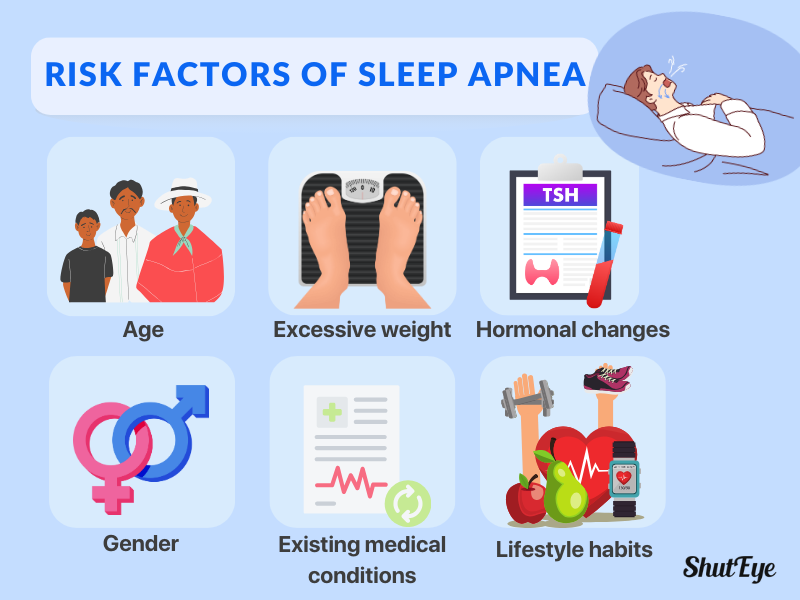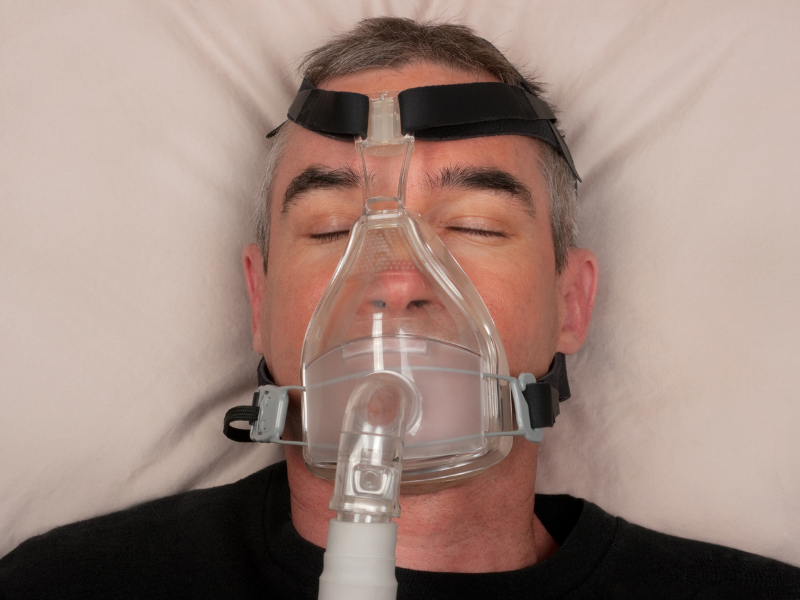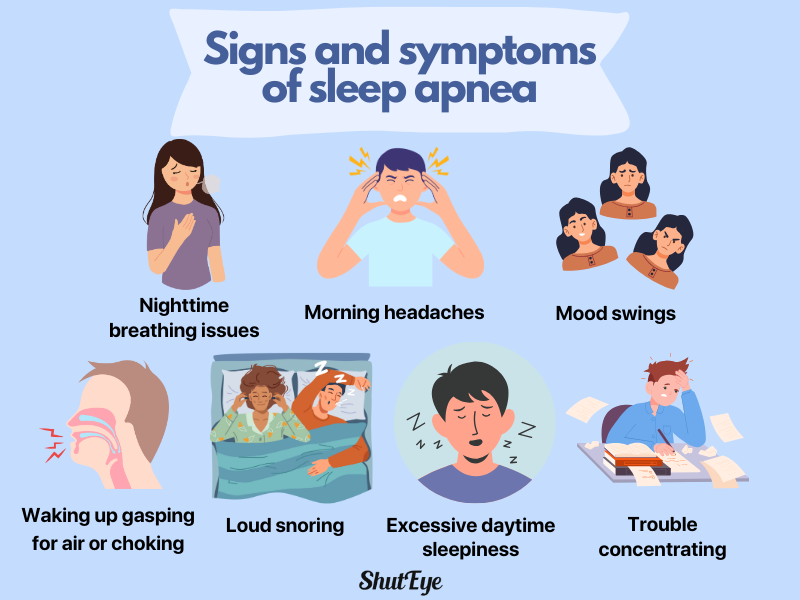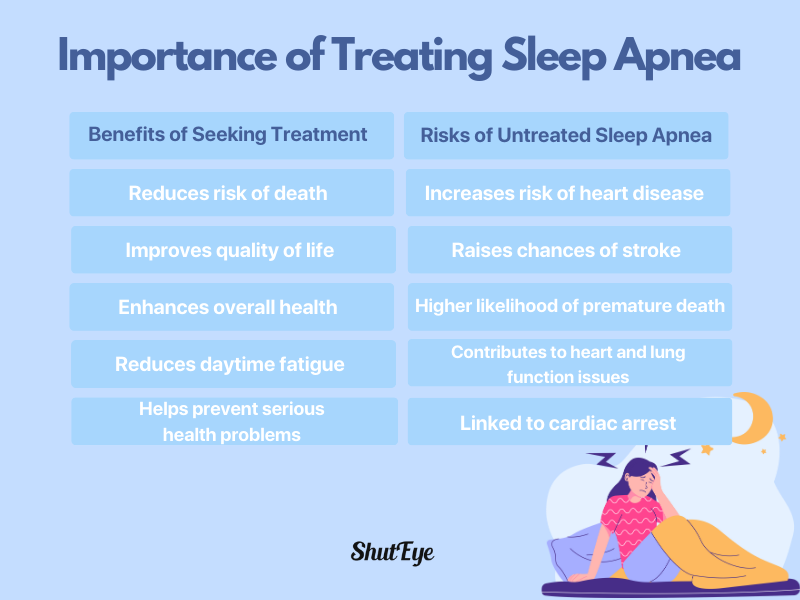


Sleep apnea is a condition that can cause temporary breathing disruptions while asleep. The thought of not breathing while asleep does sound scary. It might leave you wondering — can you die from sleep apnea?
Sleep apnea is a serious disorder that can have potentially fatal consequences if left untreated. Learn about the symptoms, the dangers, and how you can treat them to safeguard your well-being.
Sleep Apnea is one of the most common sleep disorders, characterized by repeated episodes of complete or partial obstruction of the upper airway during sleep. This obstruction typically occurs when the muscles in the back of the throat relax excessively, causing the soft tissue at the back of the throat to collapse and block the airway.
As a result, airflow is reduced or completely stopped, leading to disruptions in breathing and frequent awakenings throughout the night. Breathing disruptions vary from five times an hour to as many as 100 times an hour [1].
There are two common types of sleep apnea, known as obstructive sleep apnea and central sleep apnea [2].

As sleep apnea significantly impacts overall health and poses serious risks, it’s important to understand the risk factors that contribute to developing this condition.
The key risk factors that are associated with sleep apnea are:
Untreated sleep apnea, particularly obstructive sleep apnea, can lead to serious health risks. Some of the dangers include [3]:


By leaving obstructive sleep apnea untreated, you heighten the risk of facing fatal consequences due to various health complications, especially during sleep. Untreated sleep apnea is associated with a significant risk of death, particularly sudden death during sleep.
People with sleep apnea are at a heightened risk of experiencing fatal outcomes, especially related to cardiovascular issues, like high blood pressure or a higher risk of sudden cardiac death. The impact of obstructive sleep apnea on heart and lung function can lead to serious health complications that may result in premature death.
To highlight the potential consequences of untreated OSA, consider the following table:
| Consequence | Impact | Risk |
|---|---|---|
| Sudden Cardiac Death | Disruption in heart rhythm leading to death | High |
| Cardiovascular Issues | Increased strain on heart and blood vessels | Elevated |
| Respiratory Complications | Breathing difficulties during sleep | Severe |

If you snore loudly and wake up gasping for air, you may be experiencing symptoms of sleep apnea. Here are some signs of sleep apnea to help you recognize the condition:
For sleep apnea to be diagnosed properly, usually you would need to consult with a sleep specialist. A sleep specialist is able to assess an individual’s condition using sleep-related diagnostic tests and evaluation.
These tests include [4]:
A sleep diary is a journal that you would keep for up to 2 weeks. In this diary, you are expected to log the time that you went to bed, the times woke up, and the time that you worked in the morning. Knowing your sleep patterns will allow the doctor to better assess and diagnose your condition.
A home sleep apnea test is given if you are suspected to have sleep apnea. During this test period, you will be required to wear specialized equipment to monitor your breathing patterns. If the likelihood of sleep apnea is reflected with the equipment, your doctor will then evaluate a treatment plan for you.
A polysomnogram (PSG), also known as a sleep study, is a test that is conducted either in a lab or at home for sleep apnea diagnosis. It is designed to record brain waves during sleep continuously as well as nerve and muscle functions [5].
Besides sleep apnea, it is also used to evaluate periodic limb movement disorder (PLMD), narcolepsy, and hypersomnia.
To effectively address sleep apnea, you can explore various treatment options tailored to your symptoms and the severity of the condition. Behavioral changes like weight loss and avoiding alcohol can help reduce symptoms. Changes in sleep position, particularly sleeping on the side, can be beneficial.
Continuous Positive Airway Pressure (CPAP) therapy is a common and effective treatment for sleep apnea. CPAP therapy involves wearing a mask that delivers pressurized air to keep your airway open during sleep, improving breathing and oxygen levels.
For those who can’t tolerate CPAP or when other treatments fail, oral appliances and upper airway surgery are alternative options.

Treating sleep apnea helps with falling asleep easier and improving your overall quality of life. If left untreated, sleep apnea can significantly increase the risk of death due to its effects on heart and lung function.
By actively seeking treatment, you will not only reduce the potentially fatal consequences but also improve your quality of life. Consider the following table to understand the importance of seeking treatment for sleep apnea:
| Benefits of Seeking Treatment | Risks of Untreated Sleep Apnea |
|---|---|
| Reduces risk of death | Increases risk of heart disease |
| Improves quality of life | Raises chances of stroke |
| Enhances overall health | Higher likelihood of premature death |
| Reduces daytime fatigue | Contributes to heart and lung function issues |
| Helps prevent serious health problems | Linked to cardiac arrest |
Take proactive steps to address your sleep apnea to safeguard your well-being and longevity.
In conclusion, addressing obstructive sleep apnea is crucial for your health and well-being. Untreated OSA can have fatal consequences and significantly impact your quality of life. By recognizing the symptoms, seeking a proper diagnosis, and exploring treatment options, you can mitigate the risks associated with sleep apnea.
For more tips on sleep and sleep apnea, check out the ShutEye® app. ShutEye® is a patented sleep-tracking app that tracks your sleep cycle, and snoring and offers a personalized sleep report.
Blackwell, J. N., Walker, M., Stafford, P., Estrada, S., Adabag, S., & Kwon, Y. (2019). Sleep Apnea and Sudden Cardiac Death. Circulation reports, 1(12), 568–574. https://doi.org/10.1253/circrep.cr-19-0085
Rana AM, Sankari A. Central Sleep Apnea. [Updated 2023 Jun 11]. In: StatPearls [Internet]. Treasure Island (FL): StatPearls Publishing; 2024 Jan-. Available from: https://www.ncbi.nlm.nih.gov/books/NBK578199/